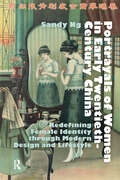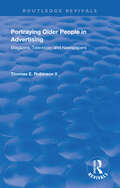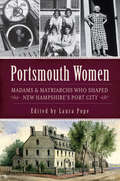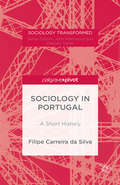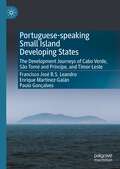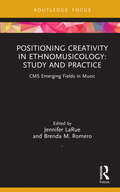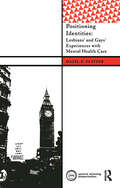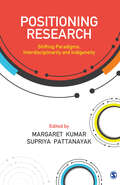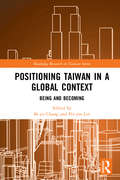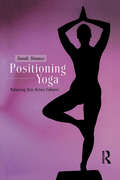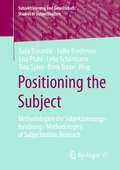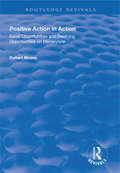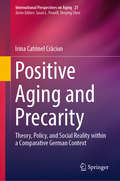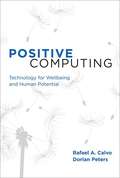- Table View
- List View
Portrayals of Women in Early Twentieth-Century China: Redefining Female Identity through Modern Design and Lifestyle
by Sandy NgPortrayals of Women in Early Twentieth-Century China explores the role played by woman, and their visual representations, in introducing modern design and modern ways of living to China. It investigates this through an analysis of how women and modern design were represented in the advertisements, photographs, and films of Republican-era China. This study explores the intersection of modernity and the Chinese woman, as they negotiated their changing identities through, and with, new designs that proliferated in Chinese households in the first half of the twentieth century. The advertisements, mass media, photographs and films took on the function of social conditioning, conveying to the viewers ideas of modern social standards, behavior and appearances. With women both instrumentalised within these images, and addressed through them, their visual representations became metaphors that fashioned a new portrait of China, while concurrently impacting on the identity, agency and subjectivity of women themselves.
Portraying Older People in Advertising
by Thomas E. Robinson IIFirst published in 1998. As society grows and changes, advertisers are faced with the challenge of matching their advertising messages to new and different target audiences. For example, children, adolescents, men, women, and "older" individuals are all audiences with specific needs, wants, and desires that advertisers must address in their advertising appeals. The purpose of this research is to determine the degree to which certain advertisements in the general interest media portray older individuals differently depending on the target audience. Specifically, this study examines advertisers’ attempts, in the electronic and print media, to target and attract the business of the older population.
Ports, Crime and Security: Governing and Policing Seaports in a Changing World
by Anna Sergi Alexandria ReidThe COVID-19 pandemic, Brexit and the US-China trade dispute have heightened interest in the geopolitics and security of modern ports. Ports are where contemporary societal dilemmas converge: the (de)regulation of international flows; the (in)visible impact of globalization; the perennial tension between trade and security; and the thin line between legitimate, illicit and illegal. Applying a multidisciplinary lens to the political economy of port security, this book presents a unique outlook on the social, economic and political factors that shape organized crime and governance. Advancing the research agenda, this text bridges the divide between global and local, and theory and practice.
Portsmouth Naval Prison (Images of America)
by Katy KramerThe Portsmouth Naval Prison, now vacant, sits at the far end of the Portsmouth Naval Shipyard on Seavey Island on the Maine and New Hampshire border. For over a century, "the Castle" or "the Rock," with its deceptively appealing exterior, has kept both visitors and New Hampshire residents in its thrall. Since its opening in 1908 to its decommissioning in 1974 and into the present day, myth and lore have surrounded this iconic building. For the 66 years it functioned, any prisoner who escaped was brought back dead or alive--or so it has been said. Only adding to the prison's mystique is its history of reform; particularly successful were the wartime restoration and rehabilitation programs. Although the prison's fearsome reputation is cemented in Darryl Ponicsan's The Last Detail, Portsmouth was a forerunner in many ways. Routine inside often reflected the latest advancements in the field. Yet, designed or deserved, the prison's legacy remains an intriguing mix of dread and redemption.
Portsmouth Women: Madams & Matriarchs Who Shaped New Hampshire's Port City (American Heritage)
by Laura PopeIn the history of Portsmouth, New Hampshire, countless women rose above a rigid society to make their marks on the seaport city. In the eighteenth century, Allice Shannon Hight became a successful tavern keeper, outliving two husbands and providing for ten children. Others flourished in more scandalous ventures, like Alta Roberts, otherwise known as the Black Mystery of Portsmouth--always donned in black, she operated a successful brothel at the Roberts House Saloon in the nineteenth century. Even greater achievements would come in later years from the likes of Mary Carey Dondero, who became one of the first women elected mayor in New England. This collection of essays, compiled by author and historian Laura Pope, celebrates the victories--large and small--of Portsmouth's notable women.
Portugal (Major European Union Nations)
by Kim EtingoffLong ago, Portugal was one of the world's most powerful countries, as it explored and conquered places far from home. Today, it is a nation that has had some economic and social struggles, but also some triumphs. It joined the EU in 1986, and continues to build on its long history. Discover more about this exciting, modern nation!
Portuguese Community of San Diego (Images of America)
by Donna Alves-Calhoun The Portuguese Historical CenterIn a century's time, Portuguese explorers had discovered two-thirds of the world. In 1542, Joao Rodrigues Cabrilho uncovered the west coast of America when he sailed into a large bay sheltered by a beautiful peninsula that would someday be known as Point Loma. By the 20th century, a small group of Portuguese immigrants had settled in the La Playa area in pursuit of a life on the sea. They brought their unique traditions and folklore customs, built churches and halls, and celebrated with Holy Spirit Festas in the streets of their new homeland. Today 19,717 make up San Diego's Portuguese community, where many of them still live in Point Loma.
Portuguese Sociology: A History (Sociology Transformed)
by Filipe Carreira da SilvaSociology in Portugal provides the first English-language account of the history of sociology in Portugal from 1945 to the present day. Banned by the fascist regime until 1974, the institutionalization of sociology as an academic discipline came relatively late. Understanding academic disciplines as institutionalized struggles over meaning, Filipe Carreira da Silva gives a genealogy of sociology in Portugal from its origins in the political-administrative interstices of a dictatorship, through the 'cyclopean moment' of the political revolution of April 1974, which brought about its swift institutionalization and subsequent consolidation in the new democratic regime, to the challenges posed by internationalization since the 1990s. Attempts to define Portugal itself, he demonstrates, have been at the heart of these struggles. Analyzing agents, institutions, contexts, instruments and ideas, Carreira da Silva shows in fascinating detail how the sociological understanding of Portugal evolved from that of a developing society in the 1960s, to that of a modernizing European social formation in the 1980s, to the post-colonial or post-imperial Portugal of today.
Portuguese in San Jose, The
by Meg RogersFor hundreds of years, Portuguese explorers have swept across the globe, many of them landing in California in the 1840s as whalers, ship jumpers, and Gold Rush immigrants. Gold was the lure, but land was the anchor. San Jose became home toPortuguese immigrants who overcame prejudice to contribute to the area politically, socially, and economically. They worked hard, transplanting farming, family, and festa traditions while working in orchards and dairies. Many came from the Azores Islands, 800 miles out to sea from mainland Portugal. For over 160 years, the Portuguese haveenriched San Jose with colorful figures, including radio star Joaquim Esteves; jeweler and filmmaker Antonio Furtado; the charismatic and controversial Fr. Lionel Noia; educator Goretti Silveira; and community leaders Vicki and Joe Machado.
Portuguese in San Leandro, The
by Meg Rogers J.A. Freitas LibraryThe Gold Rush drew the Portuguese from the Azores, sweeping them across the Atlantic Ocean and around South America's Cape Horn to the California shore. When gold failed to pan out, many Portuguese moved to the hamlet of San Leandro on the San Francisco Bay where land was reasonable and the ground fertile. Gradually the post-Gold Rush settlers joined with former Portuguese shore whalers to farm the fields of San Leandro. San Leandro became a principal landing place for newly arrived Portuguese immigrants putting down roots on small farms. A steady stream of relatives from the Azores and Hawaii poured into San Leandro's fertile foothills, and by 1911 the Portuguese comprised over two-thirds of the city's population. The early days were rough--Portuguese immigrants banded together in fraternal societies to overcome a lack of resources and to help one another navigate a strange world whose language they did not speak. Today the Portuguese Immigrant monument in Root Park's plaza commemorates the journey of Portuguese settlers who left everything behind to start a new life in the new world.
Portuguese-speaking Small Island Developing States: The Development Journeys of Cabo Verde, São Tomé and Príncipe, and Timor-Leste
by Paulo Gonçalves Francisco José Leandro Enrique Martínez-GalánThis book assesses the dynamics, challenges and achievements of the development processes of three Portuguese-speaking Small Island Developing States (PSSIDS) - Cabo Verde, São Tome and Príncipe, and Timor-Leste. Important lessons are drawn from those processes, which are relevant for policymakers, as well as for their bilateral and multilateral development partners, including international organizations such as United Nations or the Community of Portuguese Language Countries. To that end, the book includes contributions to the academic literature about SIDS, an area of research that has been significantly overlooked. The conclusions would be of interest to readers as a lead up to the fiftieth anniversary of their independence.
Poscensura (Flash Ensayo): ¿Somos tan cabrones como parece por las redes sociales?
by Juan Soto IvarsEntonces... ¿somos tan cabrones como parece por las redes sociales? En palabras del autor «¿Bastarían ciento cuarenta caracteres para que un psiquiatra diagnosticase una psicopatía?» Juan Soto Ivars pone sobre la mesa el odio artificial que se gasta en las redes haciendo hincapié en todas aquellas personas que por sus mensajes podrían ser tachadas de «infames», «piscópatas» o «inmorales». El tema no es tan sencillo de analizar cuando descubres que las redes sociales enmascaran al verdadero individuo.
Poseur: A Memoir of Downtown New York City in the '90s
by Marc SpitzMarc Spitz assumed that if he lived like his literary and rock 'n' roll heroes, he would become a great artist, too. He conveniently overlooked the fact that many of them died young, broke, and miserable. In his candid, wistful, touching, and hilarious memoir, Poseur, the music journalist, playwright, author, and blogger recounts his misspent years as a suburban kid searching for authenticity, dangerous fun, and druggy, downtown glory: first during New York's last era of risk and edge, the pre-gentrification '90s, and finally as a flamboyant and notorious rock writer, partying and posing during the music industry's heady, decadent last gasp.Part profane, confidential tell-all and part sweetly frank coming-of-age tale, this dirty, witty memoir finds Spitz careening through the scene, meeting and sometimes clashing with cultural icons like Courtney Love, Jeff Buckley, Rivers Cuomo of Weezer, Chloë Sevigny, Kim Deal, The Dandy Warhols, Guns N' Roses, Ryan Adams, Paul Rudd, Coldplay, Pavement, Peter Dinklage, Julie Bowen, The Strokes, Trent Reznor, Chuck Klosterman, Interpol, and Franz Ferdinand, as well as meeting heroes like Allen Ginsberg, Shirley Clarke, Joe Strummer, and Morrissey. Along the way he finds literary guru Gordon Lish is a long-lost relative, and erstwhile pal and sensation JT LeRoy is an even bigger poseur.Spitz refuses to give up the romantic ghost until a post-9/11 breakdown and an improbable new love (fellow music writer Lizzy Goodman) finally help him strike the hardest pose of all: his true self.
Posh Boys: How English Public Schools Ruin Britain
by Robert Verkaik&‘The latest in the series of powerful books on the divisions in modern Britain, and will take its place on many bookshelves beside Reni Eddo-Lodge&’s Why I&’m No Longer Talking to White People About Race and Owen Jones&’s Chavs.&’ –Andrew Marr, Sunday Times &‘In his fascinating, enraging polemic, Verkaik touches on one of the strangest aspects of the elite schools and their product&’s domination of public life for two and a half centuries: the acquiescence of everyone else.&’ –Observer In Britain today, the government, judiciary and military are all led by an elite who attended private school. Under their watch, our society has become increasingly divided and the gap between rich and poor is now greater than ever before. Is this the country we want to live in? If we care about inequality, we have to talk about public schools. Robert Verkaik issues a searing indictment of the system originally intended to educate the most underprivileged Britons, and outlines how, through meaningful reform, we can finally make society fairer for all.
Positioning Creativity in Ethnomusicology: Study and Practice (CMS Emerging Fields in Music)
by Brenda M. Romero Jennifer LaRueIn Positioning Creativity in Ethnomusicology: Study and Practice, ethnomusicologists succinctly demonstrate various ways of centering creativity in music higher education. Across six chapters, 12 authors with a variety of specializations and years of experience in (and outside of) academia come together to offer their answers to the question, “What might be possible if we were to (re)position creativity at the center of all we do?” Their contributions range from creative philosophical and theoretical approaches that deemphasize Western canonical views, to practical applications in ensembles, to creative ways of being respectful and reciprocal in complicated cross-cultural relationships in the field (the ethnomusicologist’s research locus), among music faculty, and with students in the classroom.Bringing together a wide range of case studies, the chapters tie anti-colonial advocacy to the creation of spaces where creativity can flourish, show how creative applied ethnomusicology benefits communities, and address the creative pedagogies required to situate diverse musical cultures in the context of academia while overcoming gaps in student and faculty understanding. Providing new insights for scholars, instructors, and students Positioning Creativity in Ethnomusicology is an essential resource that reframes how we practice and teach ethnomusicology.
Positioning Identities: Lesbians' and Gays' Experiences with Mental Health Care (International Institute for Qualitative Methodology Series)
by Hazel K PlatzerHow do lesbians and gays negotiate their sexual identities in mental health care contexts? How do they manage the institutional homophobia and heterosexism embedded in health care practice and practitioners? Using interpretive phenomenology, Hazel Platzer overturns limiting dualisms to describe the ways in which lesbians and gays are silenced and pathologized in their mental health care encounters, how they resist, and how their resistance can restrict access to care. She highlights the difficulties of researching a sensitive topic with a relatively “hidden” population, and devises innovative techniques for handling bias and a multi-methods approach to the phenomenological study of experience and identities. She then offers proactive steps toward creating a health care environment in which lesbian and gay identities are normalized, improving both access to and quality of health care.
Positioning Pooh: Edward Bear after One Hundred Years (Children's Literature Association Series)
by Jennifer HarrisonContributions by Megan De Roover, Jennifer Harrison, Sarah Jackson, Zoe Jaques, Nada Kujundžić, Ivana Milković, Niall Nance-Carroll, Perry Nodelman, David Rudd, Jonathan Chun Ngai Tsang, Nicholas Tucker, Donna Varga, and Tim WadhamOne hundred years ago, disparate events culminated in one of the most momentous happenings in the history of children’s literature. Christopher Robin Milne was born to A. A. and Dorothy “Daphne” Milne; Edward Bear, a lovable stuffed toy, arrived on the market; and a living, young bear named Winnie settled in at the London Zoo. The collaboration originally begun by the Milnes, E. H. and Florence Shepard, Winnie herself, and the many toys and personalities who fed into the Pooh legend continued to evolve throughout the twentieth and twenty-first centuries to become a global phenomenon. Yet even a brief examination of this sensation reveals that Pooh and his adventures were from the onset marked by a rich complexity behind a seeming simplicity and innocence. This volume, after a decades-long lull in concentrated Pooh scholarship, seeks to highlight the plurality of perspectives, modes, and interpretations these tales afford, especially after the Disney Corporation scooped its paws into the honeypot in the 1950s. Positioning Pooh: Edward Bear after One Hundred Years argues the doings of Pooh remain relevant for readers in a posthuman, information-centric, media-saturated, globalized age. Pooh's forays destabilize social certainties on all levels—linguistic, ontological, legal, narrative, political, and so on. Through essays that focus on geography, language, narrative, characterization, history, politics, economics, and a host of other social and cultural phenomena, contributors to this volume explore how the stories open up discourses about identity, ethics, social relations, and notions of belonging. This first volume to offer multiple perspectives from multiple authors on the Winnie-the-Pooh books in a single collection focuses on and develops approaches that bring this classic of children’s literature into the current era. Essays included not only are of relevance to scholars with an interest in Pooh, Milne, and the “golden age” of children’s literature, but also showcase the development of children’s literature scholarship in step with exciting modern developments in literary theory.
Positioning Research: Shifting Paradigms, Interdisciplinarity and Indigeneity
by Margaret Kumar Supriya PattanayakThe availability of research methodologies and frameworks to facilitate different ways of gathering knowledge and performing research is often a matter of concern for early career researchers as well as advanced research scholars. Positioning Research, while identifying this gap, provides avenues that encompass differing cultural backgrounds and disciplines to enable exploration of research frameworks and shifting paradigms, considering the impact of social media and new forms of knowledge that assist real-time, global distribution of research. The book highlights the possibilities of transition into ‘the third space’, where negotiation and dialogue are central to positioning research. It upholds the principle that different research methodologies are equally valid and valued in contributing to new knowledge. The book focuses on the contexts in which research questions are conceptualised and designed, and highlights the implications of research for the various partners and communities that participate in the research. It thus provides a cutting-edge framework for conducting multidisciplinary research.
Positioning Taiwan in a Global Context: Being and Becoming (Routledge Research on Taiwan Series)
by Pei-Yin Lin Bi-Yu ChangPositioning Taiwan in a Global Context examines modern Taiwanese culture through the prism of global cultural interactions. Challenging the view of Taiwan as a product of transience and displacement, it highlights Taiwan’s subjectivity, viewing the island as a site of a global development that epitomizes both resistance and negotiation in the process of cultural flows. The fourteen contributions by an international team of scholars investigate the multi-layered and multidirectional interplays between the island and the outside world, exploring the impact of complex cultural encounters on the construction, writing and rewriting of Taiwan in a global context. Taking an interdisciplinary approach, the topics covered range from Taiwanese literature, cinema, food culture and tourism to cultural geography, colonial history, and folk religion, with comparisons made with Japan, China, Hong Kong, the Philippines, and the West. Focusing on continuous cross-cultural interplays, this book affords readers a deeper understanding of identity politics and a better insight into the fluidity, changeability, and constructionist nature of culture. As such, it will be will be of great interest to students and scholars of Taiwan Studies and Cultural Studies, as well as Asian film, literature and popular culture.
Positioning Yoga: Balancing Acts Across Cultures
by Sarah StraussWhat is yoga? Stereotypical images of people practicing this ancient art range from white-bearded Indian mystics chanting 'om' on mountaintops to urban fitness fanatics contorted into uncomfortable looking positions. We recognize the name, but may not realize how the set of ideas and practices known as yoga moved from its birthplace on the Indian subcontinent to become a global phenomenon. Positioning Yoga considers how the recent development of yoga, from its introduction to Western audiences by the Indian Swami Vivekananda at the 1893 Parliament of the World's Religions in Chicago through to the present day, has generated specific forms of modern practice. Strauss takes us on an illuminating journey from India to Germany and America, and back again to India. While acknowledging yogas point of origin, Strauss explores how yogic practices and ideas have been transformed when they cross cultural boundaries.Yoga can be defined in many ways as an attitude, a philosophic system, a set of practices, a way of being in the world but its definition is always located within a particular historical context. What makes yoga practitioners affiliated with Swami Sivanandas Divine Life Society of Rishikesh, India - whether they hail from India, North America, or Europe - unique? What values around the world have supported the surging popularity of yoga over the past century? This absorbing book considers how lifestyle values have made yoga a global industry and shows how culture is produced and disseminated across boundaries.
Positioning the Subject: Methodologien der Subjektivierungsforschung / Methodologies of Subjectivation Research (Subjektivierung und Gesellschaft/Studies in Subjectivation)
by Tina Spies Saša Bosančić Boris Traue Folke Brodersen Lisa Pfahl Lena SchürmannSubjektivierungsforschung zielt auf ein Verständnis der subjektkonstitutiven Wirkungen von sozialen, diskursiven und materiellen Ordnungen. Sie untersucht, wie Individuen und Gruppen im Subjektivierungsgeschehen hervorgebracht werden und sich gegenseitig hervorbringen. Wie werden Subjekte positioniert? Wie positionieren sie sich selbst? Zur Untersuchung von Positionen und Positionierungen schließen die Beiträge an subjekttheoretische Ansätze sowie interpretative Verfahren an und erweitern das methodologische Repertoire der Sozial-, Kultur- und Bildungswissenschaften.Subjectivation research aims to understand how subjects are constructed through social, discursive, and material orders, examining how individuals and groups constitute themselves and each other in processes of subjectivation. How are subjects positioned? Why do they position themselves as they do? To uncover diverse positions and positionings, these contributions engage with theories of the subject as well as interpretative approaches to expand the methodological repertoire of the social, cultural and educational sciences.
Positive About Inspection
by Paul NashThis title was first published in 2000: This text helps organizations prepare for inspection by the Training Standards Council. It approaches inspection using two distinct perspectives. The first is a linear account of an inspection through "diary" entries of inspector and trainer; the second is ten typical encounters during inspection.
Positive Action in Action: Equal Opportunities and Declining Opportunities on Merseyside (Routledge Revivals)
by Robert MooreFirst published in 1997, this volume describes very clearly the various government policies to promote equal opportunity and the context of urban policy in which they have to be implemented. Robert Moore’s important study addresses the key issue of equal opportunities through a case study of events when a change in government policy appeared to hold out the prospect of new jobs for a highly deprived inner city area. It is a model for all social research of this kind. The result is a very detailed and objective analysis of the problem of implementing equal opportunity policies in practice.
Positive Aging and Precarity: Theory, Policy, and Social Reality within a Comparative German Context (International Perspectives on Aging #21)
by Irina Catrinel CrăciunThis book explores positive aging through the lens of precarity, aiming to ground positive aging theories in current social contexts. In recent years, research on aging has been branded by growing disagreements between supporters of the successful aging model and critical gerontologists who highlight the widening inequalities, disadvantages and precarity that characterize old age. This book comes to fill a gap in knowledge by offering an alternative view on positive aging, informed by precarity and its impact on projections concerning aging.The first part of the book places aging in broader theoretical and empirical context, exploring the complex links between views on aging, successful aging theories, policy and social reality. The second part uses results from a qualitative research conducted in Germany to illustrate the dissonance between successful aging ideals and both negative and positive views on aging as well as aging preparation strategies inspired by precarity. Findings from this section provide a solid starting point for comparisons with countries that are both similar and different from Germany in terms of welfare regimes and aging policies. The final part of the book discusses the psychological implications of these findings within and beyond the German case study and outlines potential solutions for practice. This book provides health psychologists, gerontologists, sociologists, social workers, health professionals as well as students and aging individuals themselves with better understanding of the meaning of aging in precarious times and builds confidence about aging well despite precarity.
Positive Computing
by Rafael A. Calvo Dorian PetersOn the eve of Google's IPO in 2004, Larry Page and Sergey Brin vowed not to be evil. Today, a growing number of technologists would go further, trying to ensure that their work actively improves people's lives. Technology, so pervasive and ubiquitous, has the capacity to increase stress and suffering; but it also has the less-heralded potential to improve the well-being of individuals, society, and the planet. In this book, Rafael Calvo and Dorian Peters investigate what they term "positive computing" -- the design and development of technology to support psychological well-being and human potential. Calvo and Peters explain that technologists' growing interest in social good is part of a larger public concern about how our digital experience affects our emotions and our quality of life -- which itself reflects an emerging focus on humanistic values in many different disciplines. Synthesizing theory, knowledge, and empirical methodologies from a variety of fields, they offer a rigorous and coherent foundational framework for positive computing. Sidebars by experts from psychology, neuroscience, human--computer interaction, and other disciplines supply essential context. Calvo and Peters examine specific well-being factors, including positive emotions, self-awareness, mindfulness, empathy, and compassion, and explore how technology can support these factors. Finally, they offer suggestions for future research and funding.SidebarsTimothy N. Bickmore, Jeremy Bailenson, danah boyd, Jane Burns, David R. Caruso, Mihaly Csikszentmihalyi, Felicia Huppert, Mary-Helen Immordino-Yang, Adele Krusche and J. Mark G. Williams, Jane McGonigal, Jonathan Nicholas, Don Norman, Yvonne Rogers
